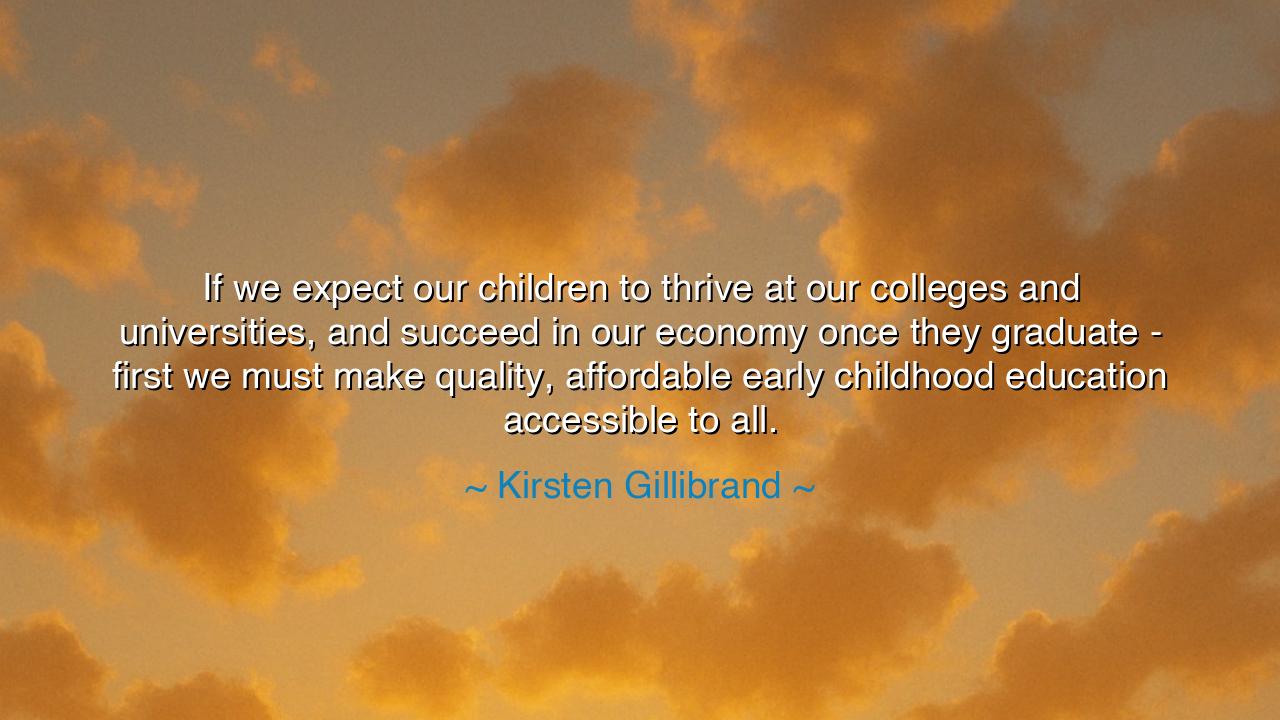
If we expect our children to thrive at our colleges and
If we expect our children to thrive at our colleges and universities, and succeed in our economy once they graduate - first we must make quality, affordable early childhood education accessible to all.






Kirsten Gillibrand, with the heart of a leader and the clarity of a mother, once proclaimed: “If we expect our children to thrive at our colleges and universities, and succeed in our economy once they graduate – first we must make quality, affordable early childhood education accessible to all.” In this utterance lies a truth as timeless as the rising of the sun: that the strength of a tree is determined not by the flowers of spring nor the fruits of autumn, but by the roots hidden in its earliest years. Education, to be strong, must begin not at the gates of higher learning, but in the nursery, where minds are first shaped and spirits first awakened.
The origin of this wisdom is found in the eternal patterns of growth. Farmers know that without good soil, no seed will flourish. Builders know that without a firm foundation, no structure will endure. So too, Gillibrand reminds us, societies must recognize that without early childhood education, the later years of study—whether in the halls of universities or in the crucible of commerce—cannot bring forth their full harvest. To invest in children’s earliest learning is to lay the cornerstone of a prosperous and just society.
History proves her words true. Consider the great experiment of Head Start in the United States, born in the 1960s during the War on Poverty. For the first time, children of poor families were given structured opportunities to learn before they entered formal schooling. Generations later, research shows the lasting impact: higher graduation rates, lower crime rates, stronger participation in the economy. This is the fruit of nurturing the mind early, when it is most receptive, most curious, most alive. Truly, the roots of success lie in the soil of childhood.
Let us remember also the example of Frederick Douglass, who was born enslaved, denied formal schooling in his youth. Yet by secretly teaching himself to read, he transformed his destiny. He later declared, “Once you learn to read, you will be forever free.” His story testifies that education is liberation, and that the earlier the gift is given, the sooner the soul rises to freedom. Gillibrand’s call, then, is not only for prosperity, but for justice—that every child, regardless of wealth, should receive the keys to unlock their future.
The meaning of Gillibrand’s words is heroic in its scope. She is not speaking only of test scores or college readiness, but of the very fabric of the economy and the health of nations. For if children are neglected in their earliest years, the cost is borne later—in broken opportunities, in wasted potential, in weakened societies. But if they are nurtured, cherished, and educated, then a nation reaps a harvest of innovation, leadership, and strength. Early education is not charity; it is the most powerful form of nation-building.
The lesson for us is clear: if we desire our children to thrive, if we long for their success in universities, in workplaces, in life itself, then we must not delay. We must invest in them while their hearts are open and their minds eager. To wait until later years is to plant seeds in rocky soil, to hope for a harvest where the roots were never given water. The greatness of a people lies in how they shape their children when they are still tender, still impressionable, still full of promise.
Practical steps stand before us. Support policies and communities that expand access to affordable early learning. Value teachers of the young not as caretakers alone, but as builders of the future. In homes, let parents read, sing, and teach their children daily, knowing that even the simplest lessons—numbers, letters, stories—are sparks that may ignite a lifetime of growth. And in society, let no child be left behind for lack of opportunity, for the loss of one mind is the loss of all.
So let Kirsten Gillibrand’s words echo like a call to the generations: “First we must make quality, affordable early childhood education accessible to all.” Hear it well, O listeners. For if we plant wisely in the morning, we shall rejoice in the harvest of the evening. But if we neglect the roots, we will lament the fruit. Choose, therefore, to invest in the youngest among us, and in doing so, you will secure the strength, wisdom, and prosperity of the world to come.






AAdministratorAdministrator
Welcome, honored guests. Please leave a comment, we will respond soon